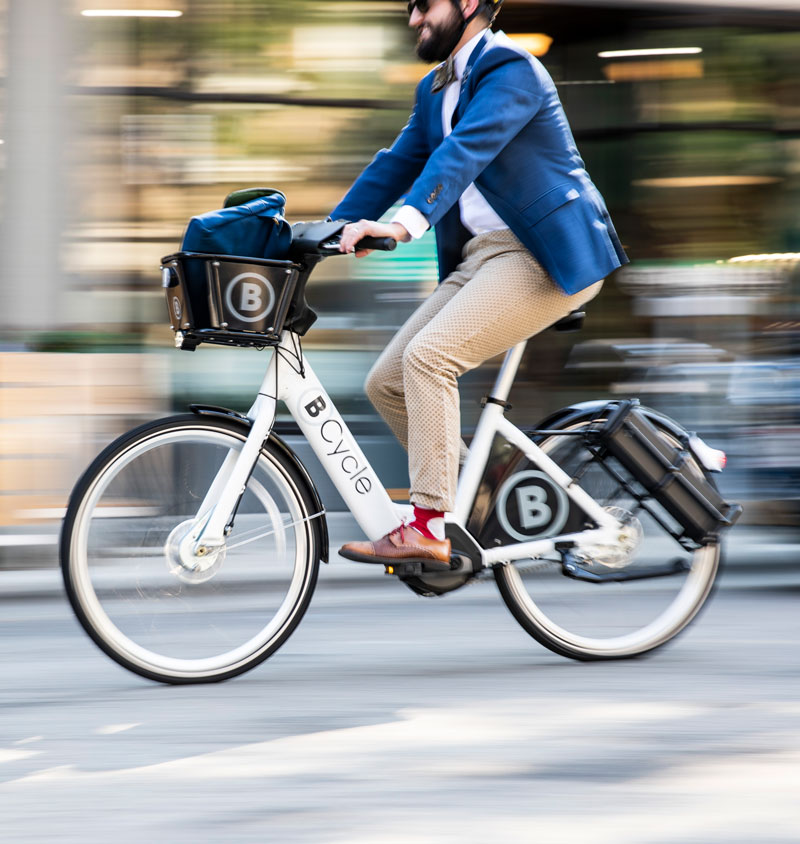by
Trek Bicycle Corporation
| Sep 01, 2020

MADISON, Wis., Aug. 31, 2020 /PRNewswire/ -- BCycle, the bike sharing system powered by Trek Bicycle, has released data from markets across the nation supporting the trending global bike boom, showing increased ridership in both traditional fleets and those with e-bikes integrated.
Examples of key markets with increased ridership numbers in 2020 compared to the same time last year include:
- Des Moines, Iowa: +29%
- Fort Worth, Texas: +50%
- Houston, Texas: +21%
- Las Vegas, Nevada: +186%
- Madison, Wisconsin: +20%
- Omaha, Nebraska.: +39%
- San Antonio, Texas: +75%
Madison BCycle recently released a comprehensive annual report exploring overall bike sharing ridership, station performance, and the impact on the local community. Results revealed that e-bikes were driving ridership, a finding that has held true from last year into 2020. Of the cities with increased bike sharing usage, only Des Moines does not have e-bikes in their fleet. At the time, even pre-pandemic, the report also showed that about 50% of the time, e-bikes were replacing driving or carpooling for 75% of BCycle members that own their own car. During a time when social distancing is the new norm, this trend appears to be growing nationwide as people look for alternative ways of travel in place of public transportation.
"At the beginning of 2020, we never could have predicted our current situation and the massive demand we're seeing within our bike sharing network across the nation," said Morgan Ramaker, BCycle Executive Director. "The bike boom is real for personally owned bicycles as well as bike sharing, with no signs of slowing down. BCycle's mission has always been to change the world by getting more people on bikes, and we're embracing the momentum and cultural shift as consumers seek out bike riding for essential transportation as well as for mental and physical health benefits."
Wisconsin-based Trek Bikes launched #GoByBike in May 2020, encouraging people to choose to ride a bike at least one trip a week, replacing other modes of transportation, for the health of our planet and people. While society is still responsibly social distancing, there has never been a better time for consumers to ride bikes – whether their own or from a bike share system – to stay healthy, help fight climate change, for fun and to shape a better future for generations to come.
BCycle offers the following tips for city-dwellers seeking out bike sharing as a transportation option:
- Don't Forget a Helmet – When sharing the road with cars and pedestrians, it's important to protect your head in the event of unexpected incidents. While many bikes have bells and lights, no one wants to share helmets which is why it's best to remember to bring your own.
- Remember the Rules of the Road – It's not illegal to ride on sidewalks in some cities, but it's encouraged to ride in the street. Cyclists should abide by all the traffic laws that cars do, and still must yield to pedestrians.
- BYO… Hand Sanitizer – BCycle has already increased sanitation protocols and is cleaning bikes several times a day, as well as disinfecting high touch areas at all stations. But just like it's the new norm is other areas of our lives; riders should wash their hands or use hand sanitizer before and after each ride to keep themselves and others safe and healthy.
All BCycle bikes are designed in Waterloo, WI by Trek Bikes. To learn more about BCycle visit bcycle.com or follow BCycle on Instagram. Download the BCycle app in the App Store or Google Play Store.
ABOUT BCYCLE
Headquartered in Waterloo, Wisconsin, BCycle LLC develops and delivers best-in-class bike share systems and is committed to providing an environmentally sustainable transportation alternative for cities. BCycle believes that bike share is the bicycle's role in public transit and is on a mission to change the world by getting more people on bikes. BCycle, a fully owned subsidiary of Trek Bicycle, partners with organizations across the country like to deliver community-based bike share. For more information, visit www.bcycle.com.
SOURCE Trek Bicycle Corporation